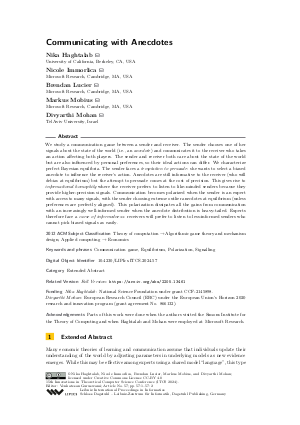@InProceedings{haghtalab_et_al:LIPIcs.ITCS.2024.57,
author = {Haghtalab, Nika and Immorlica, Nicole and Lucier, Brendan and Mobius, Markus and Mohan, Divyarthi},
title = {{Communicating with Anecdotes}},
booktitle = {15th Innovations in Theoretical Computer Science Conference (ITCS 2024)},
pages = {57:1--57:2},
series = {Leibniz International Proceedings in Informatics (LIPIcs)},
ISBN = {978-3-95977-309-6},
ISSN = {1868-8969},
year = {2024},
volume = {287},
editor = {Guruswami, Venkatesan},
publisher = {Schloss Dagstuhl -- Leibniz-Zentrum f{\"u}r Informatik},
address = {Dagstuhl, Germany},
URL = {https://drops.dagstuhl.de/entities/document/10.4230/LIPIcs.ITCS.2024.57},
URN = {urn:nbn:de:0030-drops-195852},
doi = {10.4230/LIPIcs.ITCS.2024.57},
annote = {Keywords: Communication game, Equilibrium, Polarization, Signalling}
}

 Creative Commons Attribution 4.0 International license
Creative Commons Attribution 4.0 International license
